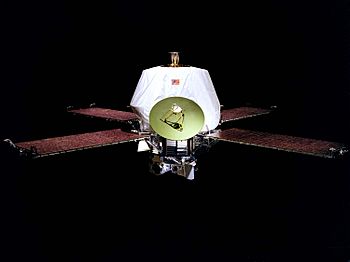Mariner 9 facts for kids

The Mariner 9 spacecraft
|
|
| Mission type | Mars orbiter |
|---|---|
| Operator | NASA / JPL |
| Mission duration | 1 year, 4 months, 27 days |
| Spacecraft properties | |
| Manufacturer | Jet Propulsion Laboratory |
| Launch mass | 997.9 kilograms (2,200 lb) |
| Dry mass | 558.8 kilograms (1,232 lb) |
| Power | 500 watts |
| Start of mission | |
| Launch date | May 30, 1971, 22:23:04 UTC |
| Rocket | Atlas SLV-3C Centaur-D |
| Launch site | Cape Canaveral LC-36B |
| End of mission | |
| Disposal | Decommissioned |
| Deactivated | October 27, 1972 |
| Orbital parameters | |
| Reference system | Areocentric |
| Periareion | 1,650 kilometres (1,030 mi) |
| Apoareion | 16,860 kilometres (10,480 mi) |
| Inclination | 64.4° |
| Period | 719.47 minutes |
| Mars orbiter | |
| Orbital insertion | November 14, 1971, 00:42:00 UTC |
Mariner 9 was a NASA spacecraft. It was part of the Mariner program, which sent probes to other planets. Mariner 9 was special because it was the first spacecraft ever to orbit another planet. That planet was Mars.
Mariner 9 launched from Cape Canaveral Air Force Station on May 30, 1971. It traveled for about 170 days to reach Mars. On November 13, 1971, it successfully entered orbit around the Red Planet.
Contents
Mariner 9's Mission to Mars
The main goals for Mariner 9 were to map a large part of Mars's surface. It aimed to map about 70% of the planet. Scientists also wanted to study how the temperature of Mars's atmosphere and surface changed.
Arrival at Mars: A Dusty Welcome
When Mariner 9 first arrived at Mars, a huge dust storm was covering the entire planet. This meant the spacecraft could not see the surface clearly. It had to wait for the dust to settle.
After a few months, the dust storm finally cleared. Mariner 9 then began its important work. It took many pictures and gathered data.
Discoveries by Mariner 9
One of Mariner 9's most famous discoveries was the Valles Marineris. This is a massive canyon system on Mars. It is much larger than the Grand Canyon on Earth. The spacecraft also sent back images of volcanoes, polar caps, and other features on Mars.
Mariner 9 continued to send back information until October 27, 1972. It taught us a lot about Mars and paved the way for future missions.
Images for kids
-
Mariner 9 view of the Noctis Labyrinthus "labyrinth" at the western end of Valles Marineris.
See also





